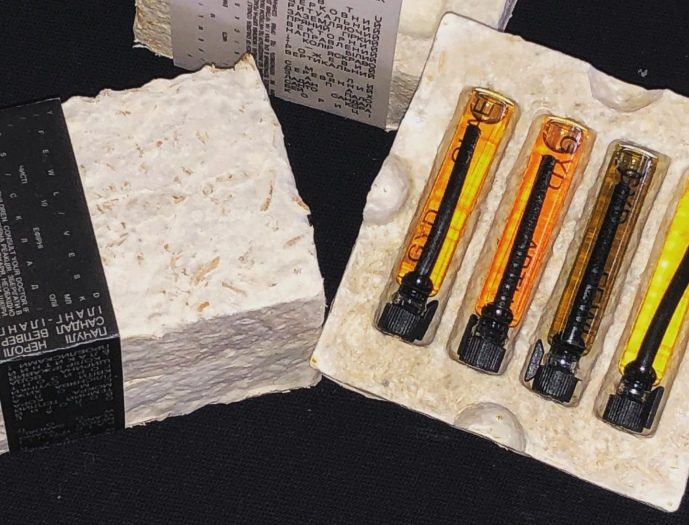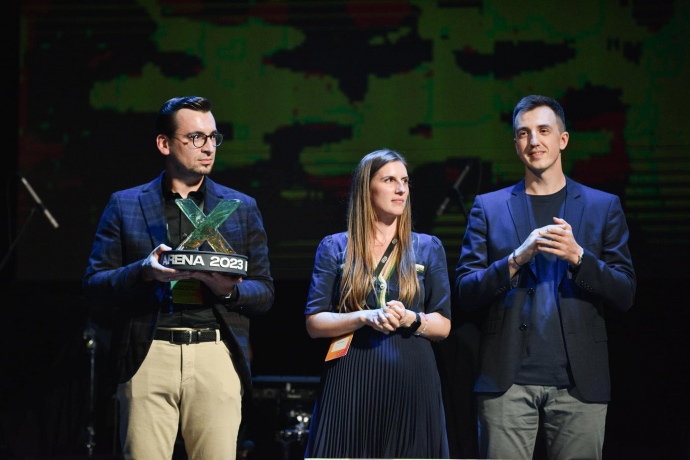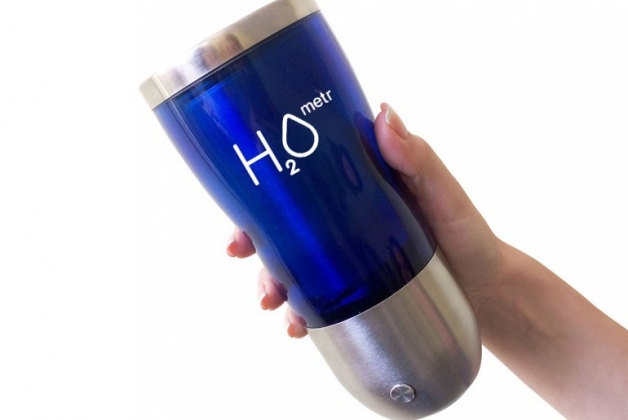A young Ukrainian startup called S.Lab is producing biodegradable packaging from leftover hemp stalks and mushroom mycelium. Positioning itself as a plastic-free alternative, the company meets growing eco-conscious demand from businesses worldwide.
Co-founders Yuliia Bialetska and Yevhen Tomilin were inspired during a 2017 trip to Bali, where they encountered mountains of plastic litter polluting pristine beaches, the couple told in an interview with Ekonomichna Pravda. This led them to research eco-friendly packaging materials as an alternative.

"We started watching videos, reading research, and studying what eco-friendly materials currently exist on the market. We wanted to create something with the same functionality as plastic, foam, or cardboard - but completely safe for the environment," Bialetska explained their motivation
Upon returning to Ukraine, the couple dove into researching potential solutions. Both had IT backgrounds, while Byaletska brought supplemental biotech knowledge.
"‘Every year, more than 2 million tons of Styrofoam packaging are produced worldwide, leading to 12 million tons of CO2 emissions. Additionally, Styrofoam is non-recyclable and takes 300 years to decompose. 30% of the world's landfills are covered with Styrofoam! Thus, the transition to eco-friendly packaging has a positive impact on climate change,’ the CEO of S.Lab told AIN.Bussines."
After several years spent exploring options and experimenting with production methods, S.Lab finally launched in Kyiv. S.Lab experimented with producing dishes, decor, and building materials before ultimately choosing to specialize in packaging materials. The packaging decomposes within a month after disposal in the soil. It provides insulation and can be molded into boxes, trays, inserts, and wraps for various products.

"When we made the first samples, feedback was 90% positive. But there were doubts that the products don't look very aesthetic. This isn't the plastic people are used to," Bialetska said.

The founding couple invested $40-50,000 personal savings into S.Lab's launch. Early sales revenue was reinvested back into the venture. Additional capital came from small innovation grants.
Bialetska noted that raw materials like waste hemp stalks and mycelium are relatively inexpensive. A key challenge facing S.Lab was scaling up manufacturing capacity from hundreds to thousands of units monthly to meet client demand and work with large corporations. But machinery to automate processes requires major capital investment. The startup's small-scale operation couldn't initially satisfy some orders for tens of thousands of packaging units.
S.Lab was gearing up to target the wider European market just as the Covid-19 pandemic struck in early 2020. This necessitated adjusting plans to focus sales efforts in Kyiv.
The startup quickly acquired local food and hospitality clients. Altruist, a Kyiv restaurant and shop, ordered decorative items, gift set packaging and sustainability-minded renovations. Beauty, fashion, electronics, and decoration companies also called for custom packaging orders. But Russia's full-scale invasion halted many Ukrainian businesses.
"After 24 February, our entire team left Ukraine. We had to leave the Kyiv laboratory, although we were able to take some of the equipment with us. We moved to Spain, as it has one of the largest industrial hemp markets in Europe, and it is easy to find suppliers here," the co-founder of S.Lab said.
By April 2022, the team began researching opportunities in Scandinavia, later expanding to France, Spain, Portugal, Germany, and Switzerland.
S.Lab operates in several market niches. Cosmetics and personal care brands appreciate the packaging's insulating properties during shipping. Luxury fashion designers and jewelers are moving to replace plastics with S.Lab's sleek mushroom packaging. And the company is courting food and pharmaceutical players, though certification is still needed for edibles.

"We expect full replacement of plastics with natural materials soon. The eco-packaging segment already grows 15-20% annually, though market demand is much higher," Bialetska said.
The EU now comprises 70-80% of sales, but Ukrainian companies are steadily returning as clients. Positive reviews are also attracting fresh local interest.
"‘If previously 80% of our clients were from Ukraine, we now expect that soon 80% of sales will be in the EU. Even before the war started, all experts advised expanding into new markets, rather than focusing solely on one. Therefore, we are increasing production volumes and expanding geographically. At the same time, we are preparing innovative technology for further scaling in Ukraine," Bialetska explained.

Currently, the company is focusing its investments on establishing a production line, a strategic priority given the influx of pre-orders. The founders anticipate operationalizing the production line by the year's end.
"From May-June, clients began returning to us. However, we are consciously choosing not to divert our attention away from our primary goal at this time. A fully operational production line is a more strategic and significant objective than engaging in small, immediate deals. We plan for it to be operational by the end of the year,’ Yuliia said.
Byaletska explained that major corporations like Samsung seek to replace millions of plastic packaging inserts with S.Lab's eco-alternative. However, the startup cannot yet accommodate such volumes.
“Samsung wants to swap parts of their TV packaging for ours, but they produce 5 million TVs annually. We can't cover such volumes yet,” Bialetska explained.
In 2022, S.Lab was selected by the Startup Wise Guys accelerator, netting €80,000 in funding. The competitive 3-month program enabled researching Scandinavian markets.
Most recently, S.Lab won a €210,000 investment package ($100,000 from ZAS Venture, $10,000 from investor Sasha Reminnyi, and €100,000 from Vesna Capital) at the IT Arena conference, recognizing its growth potential.
At this year's IT Arena tech conference, which took place from 29 September to 1 October in Lviv, where S.Lab won first place, Numo, a startup that created an app that helps people with attention deficit disorder organize tasks, took second place. The third place went to Jetbeep, a project developing a platform for mobile wallets.

The conference also awarded startups in the defense industry. The first place went to the developers of Himera G1 radio, an inexpensive encrypted military radio not jammed by Russian electronic warfare.
The second place went to the creators of Zvook, a hardware and software system capable of detecting cruise missiles, helicopters, UAVs, and enemy aircraft at low and medium altitudes by sound.
And the Falcons project, which produces software and hardware for Ukraine's Armed Forces, took third place.
Based on reporting by Anastasiia Diachkina/Ekonomichna Pravda
Read also:
- Mother of fallen “Ghost of Kyiv” pilot opens rehab center for veterans
- Elderly Japanese with golden heart opens free cafe in bombed-out Kharkiv
- Over 30 Ukrainian writers died defending Ukraine, with more than 80 currently serving\
- Ukrainians’ optimism exceeds pre-war levels despite economic hardships: survey





